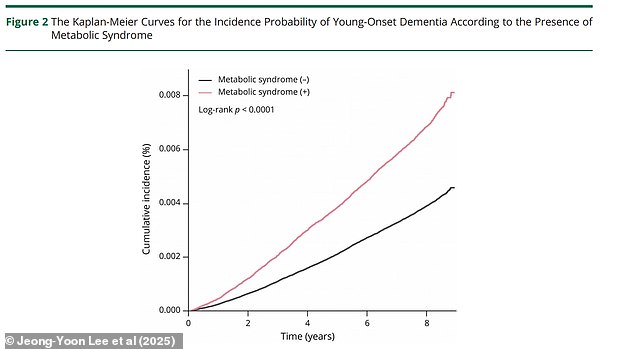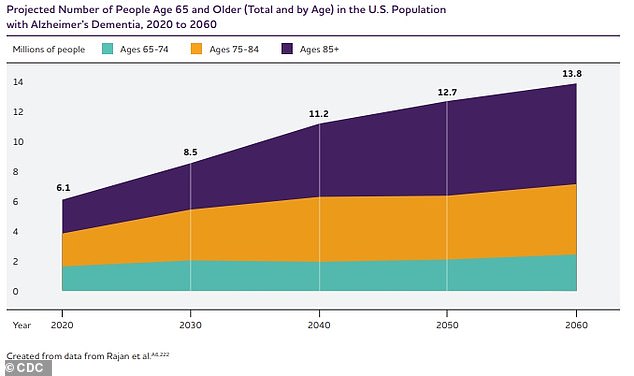-
EXPLORE FURTHER: Blood Test Might Predict Alzheimer’s Risk Years Ahead
Many more Americans might face an increased threat of premature dementia following scientific identification of a potential new trigger.
Researchers from
South Korea
discovering that someone has an uncommon condition called metabolic syndrome increases their likelihood of developing early-onset dementia (diagnosed before the age of 65) by 24 percent.
Metabolic syndrome is identified when an individual exhibits three or more of these conditions: excess abdominal fat, elevated blood pressure, increased blood glucose levels, raised triglyceride concentrations, or reduced amounts of beneficial HDL cholesterol.
However, investigators discovered that the risk increased with each additional condition; individuals suffering from all five faced a 70 percent higher risk.
The researchers did not offer an explanation for the potential connection; however, factors such as obesity, hypertension, low levels of HDL cholesterol, and elevated blood glucose – particularly in individuals with
diabetes
– have all been associated with a higher likelihood of developing dementia.
These conditions are thought to cause an accumulation of plaque in the arteries, potentially damaging brain cells and obstructing blood flow to the brain. This reduces the body’s capacity to remove harmful waste. Additionally, they might promote the build-up of amyloid and tau proteins—two substances closely associated with this issue.
Alzheimer’s
disease.
On the contrary, elevated triglyceride levels have been linked to a reduced risk of developing dementia.
The researchers indicated that their conclusions were alarming, considering the rising incidence of metabolic syndrome over recent years.


The precise figure for metabolic syndrome cases remains unknown, yet according to data from 2020,
study
published in JAMA found about 37 percent of US adults were estimated to have metabolic syndrome in 2016, compared to 32 percent in 2011 – the most recent comparable figures available.
Meanwhile, 640,000 Americans are dealing with early-onset dementia, a figure that continues to increase.
And overall cases of the disease are also increasing. There were 514,000 new cases of dementia among Americans in 2020, but that will rise to 730,000 in 2030 and 1.03million in 2060.
Scientists from Hallym University Sacred Heart Hospital located in Anyang, South Korea, examined health insurance records of 2 million individuals aged between 40 and 60 years.
They analyzed records from doctors appointments that included waist circumference, blood pressure, blood sugar and triglyceride and cholesterol levels.
In the study published in the journal Neurology, 25 percent of the participants had metabolic syndrome.
During an eight-year follow-up period, approximately 9,000 individuals—0.45 percent of the total—were diagnosed with some type of dementia before reaching the age of 65.
The data showed that women with metabolic syndrome had a greater likelihood of experiencing early-onset dementia—34 percent—compared to men, who had a 15 percent risk.
Moreover, individuals in their 40s faced greater danger compared to those in their 50s.
Currently nearly 8million Americans currently have some form of dementia and there are around 500,000 new cases diagnosed per year.
Alzheimer’s is the most common form – with 7million diagnoses – but as the aging population of the US continues to grow, so will diagnoses. By 2050, the number of Alzheimer’s patients is projected to rise to nearly 13 million.

Although the primary reason for dementia remains controversial, researchers think that the condition probably stems from an unusual accumulation of proteins—specifically amyloid and tau—in and around neurons within the brain.
In individuals with Alzheimer’s, the body fails to efficiently remove amyloid proteins, which ultimately accumulate into plaques within the brain.
Additionally, tau proteins detach from neurons and form tangles, causing neurons to die.
When neurons die, messages can’t be delivered as effectively throughout the brain, which scientists believe is what causes the thinking difficulties in dementia.
Genetics also play a strong role in the risk of Alzheimer’s and in 2022 researchers identified 31 new genes that appear to affect processes that play a role in the disease.
Dementia has no known cure; however, various medications and therapies can help manage the symptoms.
To prevent metabolic syndrome, experts recommended adopting a nutritious eating plan, staying physically active, keeping a healthy body weight, stopping tobacco use, and managing stress levels.
And while this study has begun to look at the relationship between metabolic syndrome and early dementia, study author Dr Minwoo Lee said more needs to be done.
He added: ‘Future research that follows people over longer periods of time and uses brain scans to look for biomarkers of dementia is needed to confirm and expand upon our findings.’
Read more


